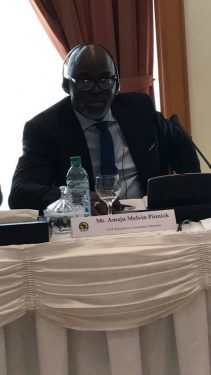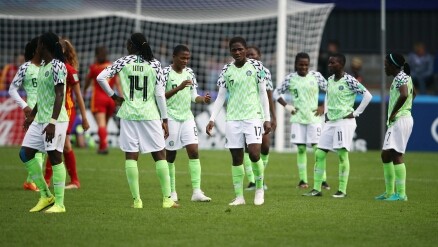Nigeria’s women’s national under-20 team; the Falconets lost 1-2 to Spain at the quarter-final stage of the 2018 World Championship on Thursday, bringing an end to a rather infamous participation in the gathering of the best under-20 teams in the world.
The Falconets, coached by Christopher “Musa” Danjuma left Nigeria in the midst of an obnoxious battle for the leadership of Nigeria Football Federation but were highly regarded among women’s football followers in the county, with talks of a likely final appearance among the heightened expectations.
Nigeria, an ever-present at the tournament was participating in their ninth world Under-20 event, the honour they share only with Brazil, Germany and the United States of America. Led by the talented Rasheedat Ajibade who had previously been to three FIFA underage tournaments (under-17 and under-20) and with a number of fringe Super Falcons players; an average Nigerian football fan would normally expect the team to excel.
A willful defeat to Germany in their opening group game, a paradoxical victory over Haiti in their second game and a scarcely earned last gasp draw with China in their final group game set Nigeria up nicely against one of the best teams of the tournament, Spain in the quarter-final.

As it turned out, this set of Falconets fell short of those inordinate expectations, exhibiting a prevailing teething problem which eventually hampered their flight in the serene breeze of France. They deservedly lost to the Europeans, a team they defeated at the group stage of the last edition in Papua New Guinea.
The team’s shortcoming can simply be encapsulated in the words of a respected former Nigerian international, Adokiye Amiesimaka who said “there is no rhythm or reason to any success Nigeria achieves in football.”
Here are some fundamental reasons to Nigeria’s failure at the international stage, once again.
Inadequate football nursery
It is hard to emphasise often that a lack of proper academy structure has always been a pain in the neck for Nigerian teams – especially at club level where majority of these Falconets came from -.
The players showed a gross lack of understanding of the basics of the game; characterised by poor first touches, organisational lapses and vivid defect in tactical understanding of players’ positioning and movements. Well, it is not their fault, it is that of the system that produced them.
The gathering in France is one to showcase the best that each country’s women league have to showcase in terms of teenagers and while Nigeria’s squad truly comprises of some of the best youngsters in the league, their quality fell way behind their contemporaries, even from Haiti.
Lack of proper footballing plan
A philosophy in game approach or a constructed plan which players take onto the pitch ahead to execute in each game was conspicuously missing from the Falconets’ play. One time, they are attempting to build-up gradually and within minutes, the plans change to “no bouncing ball”. At times they press their opponents (albeit half heartedly) and minutes later, they are sitting deep.
If the plan was to hoof the ball forward, then how do you play Ajibade as the lone centre forward and a shorter Igboamalu close to her? Of course it remains a surprise that Anam Imo was benched for Nigeria’s final two games whilst her replacement, Monday Gift did not last for more than fifty minutes in both games. A seeming lack of genuine thoughts towards what should be done in a game made for the wrong combination of players, generally which takes us to the next point.
Coaching predicament
“Go, go, go, go, go…..”
“Where are they going now?” asked my seven-year old nephew watching the game with me in response to the chants (not instructions) emanating from the Nigerian bench. Such is the manner of the per-second instructions from coach Danjuma which were hardly ever geared towards tactical or technical information to the players.
Again, this is one of the best coaches in the league and has won the Nigeria Women Football League title twice with Nasarawa Amazons who had five of their players in France. A combination of a set of players lacking the basic rudiment of the game with a coach like Danjuma will always bring forth results as seen in France.
Some of the coach’s choice in France were baffling to be honest. A makeshift centre back of Mary Ologbosere (a right back) and Chidinma Okeke (a centre forward) featured in every minute of the tournament for Nigeria. The youngest player in the team, Bashirat Amoo, also started every game despite seen to over-labour one of the team’s standout players, Christy Ucheibe in midfield every time, then the Imo – Gift situation.
Waiting until a global tournament before trying out new things are hardly ever productive and although many of his substitutions were productive, the effectiveness of team management also lies a lot in being proactive, rather than reactive.
Ajibade must define and redefine herself
When the FC Robo player attended her first FIFA tournament as a 14-year old in the 2014 Under-17 Championship, many already saw in Rasheedat Ajibade, the next prodigy after Asisat Oshoala. Perhaps the fact that both stars came from the respected Robo factory drew comparisons with the great Asisat and instantly set the bar on what is required from her.
Four years after and with four FIFA tournaments under her belt, she has not proved on the global stage, the enormous hype surrounding her. A few awards here and there, but for a player with such natural abilities, it is high time Ajibade realised the weight of hope hanging around her neck and make technical and structural adaptations to her game.
First, I found it puzzling to see that a player who should be the best player, leader and playmaker of her teams – both at national and club level – is content with staying upfront as a lone striker and waiting for passes that may never come. I watched FC Robo’s Lagos FA Cup final game against Young Talent Queens in Agege in June. Ajibade scored both goals in a 2-0 win but I was surprised, seeing her in a van Nistelrooy role even at club level.
She still has a lot to add to her game most especially in quick and accurate decision-making but first, Ajibade must jettison the idea of being a centre forward and go to either of the flanks or deep behind the striker to have more general impact on his team’s play.
Over to you, NFF
With the lingering crisis bedeviling Nigerian football, one wonders who would take responsibility for the team’s showing. The Amaju Pinnick-led board or the Sports Minister who has taken over as the bonus giver for the team? Whoever that is, it is imperative for the Football Federation that once the coast clears, they must strive to chart a workable foundational course for Nigeria’s underage teams.

Ordinarily, exiting at the quarter final stage of an underage tournament should not be a failure but that is only if it was seen in the side, a definite plan capable of being worked upon in the future or if there are enough players capable of progressing to the next level immediately.
In France, Nigeria faced teams with definite plan for their football; not some desperate “anywhere belle face” pattern. Additionally, the retraining of coaches is now a must as majority of our team handlers are finding it a rocket science to adapt to modern trends in the ever evolving round leather game.
In all, there is also a need for proper planning ahead of these competitions which should include the prompt naming of coaches for the teams and the Federation’s stinginess at allowing the teams play intercontinental invitational competitions must be addressed too.
The Under-17s failed to qualify for their own World Championship due to some of these factors aforementioned, So, the Federation must begin genuine work now to unearth some of the budding talents and make them undergo a footballing education programme within their first years. The matter of the functioning or otherwise of Federation’s Technical Committee is certainly one for another day.














